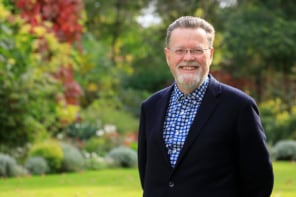Scott Russell Sanders is an essayist and professor of English at Indiana University in the US. He has published over 20 books, including a memoir, A Private History of Awe, which describes the impact of his time as a PhD student in the UK and his lifelong fascination with physics and other sciences

Why did you choose to study physics?
I spent much of my childhood outdoors, exploring the woods, fields and creeks. I was drawn to science initially as a way of learning about the aspects of nature that I could actually see — rocks, bugs, clouds, fossils, birds, stars and the like. As I grew up in Tennessee and Ohio during the 1950s and 1960s, reading about nuclear weapons and satellite launches, I became more interested in the dimensions of nature that I could not see — the infinitesimally small and the unimaginably large — and in the evolution of the universe. This interest led me, as a high-school student, to the passionate study of physics.
Why did you decide to shift from science into literature?
Much as I relished the study of science in general and physics in particular, when I was an undergraduate at Brown University I became preoccupied with questions that science could not address. I wanted to understand why racial prejudice divided our society, why women had for so long been subordinated to men, why the US was at war in Vietnam. I brooded on questions about the ultimate source of things, about how to make ethical choices, about the meaning of life. Unlike physics, literature dealt with these messy, elusive, vital matters. I was also disturbed to learn how much of the funding for research in physics, at least in the US, is tied to the military. Militarism continues to distort our research priorities — as one sees today in the billions spent on the so-called missile shield and on the refinement of nuclear weapons.
You moved around a lot when you were young. How did that shape your career?
Thanks to a Marshall Scholarship, a gift from the British public, my wife and I spent the four years from 1967 at Cambridge University in the UK, where I earned my PhD in English literature. I had never travelled abroad before, nor had I ever encountered the depth of human presence — the strata of history — that I found everywhere we went in the UK and the rest of Europe. It was exhilarating for me to read classic works of English literature while visiting some of the places where these works were composed. Paradoxically, as much as I relished my sojourn in Cambridge, it had the effect of sharpening my awareness of myself as an American, and specifically as a Midwesterner. When I completed my degree in 1971, my wife and I returned to the American Midwest, where I took up a position at Indiana University, a position I still hold 38 years later.
Did you experience a personal “tipping point” that made you decide to write about conservation?
I have been preoccupied with environmental issues since my graduate years at Cambridge. Early on, I thought of the problems as local — pollution in a river, say — or as isolable, like the impact of DDT — and therefore as being things that we could remedy in a straightforward way. We could stop dumping toxins in the river, stop using DDT. But gradually, during the 1970s and 1980s, I came to realize that human actions were destabilizing living systems on a global scale — through acid rain, depletion of the ozone layer, pollution and overfishing of the oceans, greenhouse emissions, spreading of deserts, destruction of rainforests, the extinction of species, and so on. Through a series of books, beginning with Staying Put and continuing through Hunting for Hope, I addressed these assaults on the Earth’s living systems not as technical or economic problems but as cultural problems. My most recent book, A Conservationist Manifesto (Indiana University Press), brings these arguments together in one place, and calls for profound cultural change, above all in my own profligate country.
What advice would you give to science students today who are concerned about the environment?
I would tell them that we need all the knowledge that science can offer concerning every dimension of the planet, from tectonic plates to atmosphere, from rotifers to watersheds. So whatever domain of science you pursue, it may help us to grapple with environmental challenges. Your work is more likely to serve this larger purpose if you always bear in mind the big picture, instead of limiting yourself to a narrow specialty. Remember that our disciplinary boundaries are arbitrary conveniences; nature is a whole. Learn to work with the media to bring the widest attention to your findings. Do not be afraid to speak out about the implications of your research, even when those implications range into politics, economics and culture. The planet needs your knowledge and your voice.


